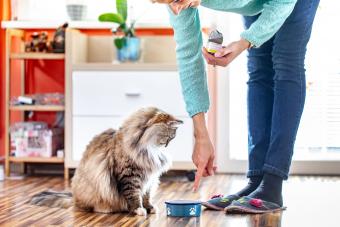
Cats should not eat dog food. Meat is the natural diet for all felines. Kitties cannot convert fats and proteins from vegetables into amino acids and fatty acids to function properly. With that in mind, the ingredients in dog food are not appropriate for our feline friends.
Can Cats Eat Dog Food?
Nope! Cats are obligate carnivores and not vegans. A feline's digestive system is designed to process meat. On the other hand, dogs are omnivores, and their food comes from both plant and animal origin. Dog food is not made with cats in mind! For example, cats must have the amino acids found in meat to survive. Dogs and cats have different requirements for minerals and vitamins.
Protein Requirements for Dogs and Cats
The Association of American Feed Control Officials (AFFCO) gives specific protein requirements for dogs and cats on a dry matter basis. Food requirements for cats are different than dogs.
- Adult dogs: 18 percent minimum
- Adult cats: 26 percent minimum
Dog Food Lacks the Sufficient Amount of Vitamin A
The vitamins needed for essential cat nutrition include D, K, E, B, and A. Cats cannot manufacture vitamin A! Some dog foods may contain additional vitamin A, but they won't have the amounts a cat needs for optimum health.
Taurine Is Essential
Cats need taurine. A dog's body manufactures taurine, but a cat's body cannot! If your cat is eating dog food over the long-term, he won't get this essential amino acid. Insufficient taurine in a cat's diet may lead to heart disease or even blindness!
Dogs Only Produce Arachidonic Acid
Dogs also produce arachidonic acid naturally, and cats need to ingest it through meals. Dog food does not contain arachidonic acid, which helps maintain your kitty's kidneys and healthy coat.
Certain Ingredients Are Bad for Cats
A cat's diet contains the right balance of nutrients to maintain proper health. A feline's natural diet is typically low in grains. Some dog food may not be grain-free, which typically includes wheat, corn, rice, and oats. Grain-free food is what cats eat in the wild!
One-Time Feeding Is an Issue
Occasional bites are ok, but your cat should never eat dog food as a meal. If you cannot find any cat food in the pantry and it is midnight, you can feed your cat a small bowl but don't make this a habit.
Can Cats Eat Dog Food Long-Term?
AAFCO's minimum protein values are required to prevent disease caused by a lack of dietary protein. If a cat eats dog food over the long-term, felines may develop several diseases as it is clear cats need a meat-based diet.

Free-Feeding May Work Best for Your Kitty
If you live with multiple species and your cat enjoys a dog food snack when his food is not available, try free-feeding your cat. Choose a room your cat can access that your dog cannot get to during the day. Leave your cat's food out all day, and he'll be more enthusiastic about eating his food rather than his canine friend's kibble. This behavior may occur if your cat is hungry between meals. Do not encourage your dog to share a meal with his buddy.
Feed Your Cat and Dog in Different Rooms
If your cat is eating dog food, your little buddy is not getting all the nutrients he needs. Eating dog food may lead to heart disease or even blindness. Please make sure both your dog and cat are always fed in two different rooms, so there is no confusion and your cat only eats out of his bowl. This technique (similar to the above) avoids the need for your pets to share meals.
Cats Need Kitty Food
If you run into an emergency and your cat needs to eat, it is ok to use dog kibble for a small meal. If pet parents continuously feed dog food to a cat, they may become sick and need to see the vet. Your feline may experience an upset stomach, diarrhea, or even a chronic disease due to a lack of nutrients. A vet provides advice on the best type of cat food to feed your kitty, so reach out to your clinic if there are concerns and your cat is always sneaking dog kibble.







